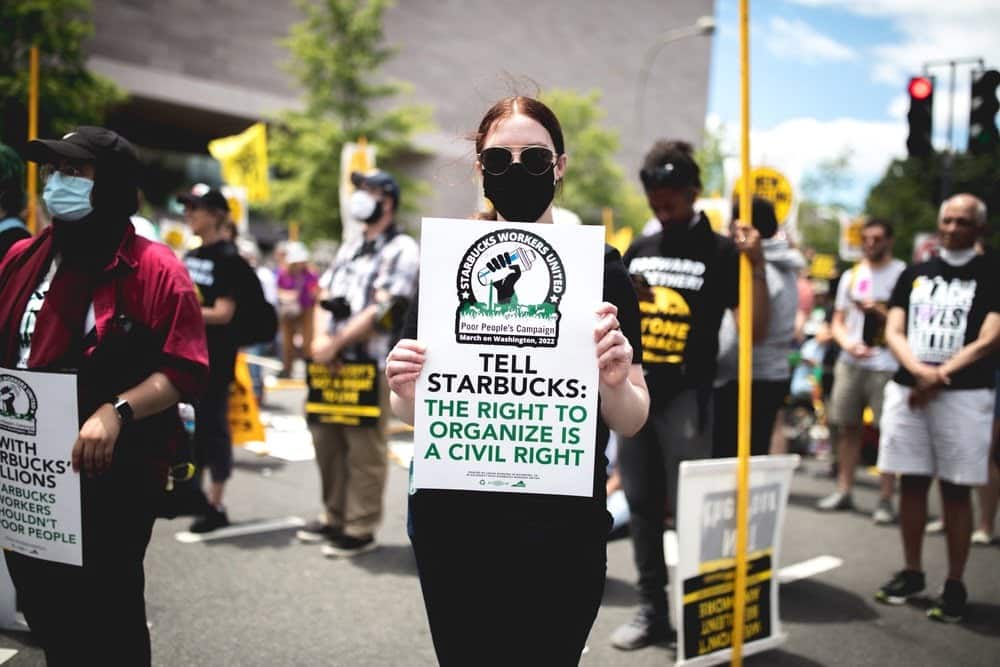Outgoing Starbucks CEO Howard Schultz, in a recent interview with CNN, proudly showed off his newest invention: a tablespoon of olive oil added to a cup of coffee to bring out rich, complex flavors.
The conversation was meant to showcase Schultz’s commitment to Starbucks coffee as he prepared to step down as CEO of the company for the third time. But it took place in Italy, prompting his interviewer to ask: Why wasn’t Schultz sitting down with unionizing workers back home?
Indeed, Schultz — who is worth some $3.7 billion — has been operating as union-buster-in-chief of the iconic corporation.
Since the first group of Starbucks workers unionized a café in Buffalo in late 2021, more than 278 stores have done the same, according to Starbucks Workers United. Still, the number of unionized cafés remains a tiny fraction — about 3 percent — of all stores.
Early on, Schultz admitted to workers that the company had failed to give them the tools they needed, such as better staffing and training. But Schultz’s response was to create an uneven playing field and punish workers for daring to demand better conditions.
In 2022, Schultz reportedly rewarded nonunion workers with better wages and benefits, as well as credit card tipping, and denied the same to people working in union stores. As a result, the New York Times reported, “Filings for union elections dropped from more than 60 a month in March and April to under 10 in August.”
Meanwhile, the company is firing union leaders such as Starbucks worker Hannah Whitbeck in Ann Arbor, Michigan. Her termination prompted a lawsuit and a federal judge’s decision that prohibited the Ann Arbor store from firing workers for union activity.
The company has also been understaffing stores that are unionizing, a move that the union says is a deliberate ploy to make workers’ lives more difficult. Schultz has even closed entire stores that have dared to take up union activity, including the first store in Seattle to unionize.
“This is just the beginning. There are going to be many more,” warned Schultz in July 2022.
As long as an employer can abuse workers, there is a need for unions. And union activity is surging, with a 50 percent increase in strike activity last year compared to the year before, according to the Bureau of Labor Statistics.
Shultz apparently sees himself as above the law. He refused to testify about his company’s 75 documented violations of federal labor laws in front of the Senate Health, Education, Labor, and Pensions Committee, chaired by Senator Bernie Sanders, until Sanders forced him to with a subpoena.
But not every company is fighting its own workers tooth and nail. When Toyota workers in Japan asked for the largest pay hike in 20 years, the automaker agreed to all the union’s demands in the very first round of negotiations.
Toyota’s head Koji Sato said the move was intended as an example “for the industry as a whole.” It worked. Hours after Toyota’s announcement, Honda accepted its own union’s demands in full.
No so for Starbucks. Schultz has ruined the company’s reputation for caring about its workers and become the poster child,even in the business world, of what not to do when faced with union activity.
Starbucks should take a page out of Toyota’s book. In his CNN interview, even Schultz admitted that what Starbucks workers want more than anything is “a seat at the table.” He added, “It’s hard to walk in someone else’s shoes, but you’ve got to do that a little bit.”
Instead of experimenting with olive oil in coffee, he could try something else that’s new for him — treating workers with the same respect that he commands.
This commentary was produced by the Economy for All project at the Independent Media Institute and adapted for syndication by OtherWords.org.







